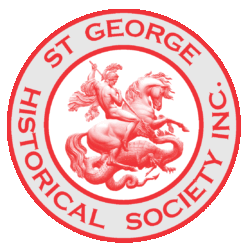by Alexander Belford Christison, M. B. E.
In the year 1898, Mr. J. C. Walker of Rockdale, who had been a conductor of military and public bands in Sydney and suburbs for some years, decided to form a brass band in Rockdale. He had a few instrumentalists who were willing to join, but not sufficient for a complete band. There were many young men who were willing to learn, but no instruments were available.
Mr. Henry Kinsel of “Kinsel Grove”, Bexley, a friend of Mr. Walker’s, offered to make a donation and also to lend sufficient money to purchase the necessary instruments.
Captain Berry of the Rockdale Fire Brigade, offered the recreation room of the Fire Station as a practice room for the band.
Mr. Walker taught a number of the young men to play the various instruments and in a short time had a good combination.
At the inaugural meeting, it was decided to take the name of “Rockdale Fire Brigade Band”, with Mr. Walker as conductor and chairman and Mr. Gus Ostland as secretary.
In order to meet their financial obligations, it was decided to approach the business people of Rockdale for assistance and in return the band would give its services by playing in the shopping centre on Saturday nights, the shops then closing at 10 p.m. This arrangement proved quite successful as it brought crowds from other suburbs and naturally the business people benefited quite a lot financially.
This arrangement continued for many years until the beginning of World War II.
The Band’s first patron was Mr. Thomas Saywell, who owned practically all of Lady Robinson’s Beach (now Brighton-le -Sands) and the President, Mr. Jack Barsby, owned a draper’s store at the corner of Rocky Point Road (now Prince’s Highway) and Bay Street, Rockdale.
The Band entered its first competition held on the Sydney Cricket Ground, under the auspices of the Highland Society of New South Wales at their annual Highland Gathering, and it was fortunate enough to win first prize. Throughout its lifetime it won a great many prizes.
Although the Band had been carrying on successfully for some time an incident occurred which was to cause a change in its name. The Band as usual was playing in the main street of Rockdale on the Saturday night but in one of the side streets one of this State’s politicians was speaking on behalf of a candidate for the coming elections. It is not known whether the Band’s music attracted the crowd away from the speaker but he became very annoyed and made some very nasty remarks about the Band and wanted to know what Band it was.
It so happened that the politician was a member of the Fire Brigade Board, to whom he complained, with the result that orders were given that the Band had to vacate its practice room at the Fire Station, Also, it had to drop the name of Fire Brigade.
The business people and supporters of the Band were very annoyed at this turn of events.
It was then suggested that an approach be made to the Rockdale Municipal Council to allow the Band to take the name of the “Rockdale Municipal Band” and although there were one or two objectors the Band then became known under this name.
Naturally it had to try to find a place to practice and after very serious consideration, it was decided to buy a block of ground in Cameron Street, near Bay Street, Rockdale.
Members of the Band personally approached people of the district for financial support and finally sufficient donations were collected to pay for the ground. They were then successful in floating a loan from a businessman in Rockdale which enabled them to build their hall. Costs were kept down by members giving voluntary labour in the building of same.
The hail became very popular for dances, weddings and socials with the result that the debt on the hall was soon paid off and the hall became the property of the Band.
The politician really did the Band a good turn for he resulted in it getting a home of its own.
Alderman William Taylor, M.L.A., Mayor of Rockdale, was patron for a number of years, followed by Mr. Carl Skarratt of Bexley. Both these gentlemen have passed on. Mr. Alan Stirling was President for a good many years.
Besides Mr. Ostland, the following members occupied the position of secretary, Mr. H. Wennholtn (original proprietor and editor of the “Propeller” Newspaper) 4 years; Mr. J. P. Parr, 2 years; Mr. A.B. Christison, M.B.E. (who pioneered and organised the St. George Eisteddfod in 1916 for the purpose of assisting the Band’s finances) 33 years; and finally Mr. A. Green.
Mr. Charles Walker (son of the Bandmaster) became the champion cornetist of New South Wales.
During the First World War, the Band worked very hard to supply the soldiers with comforts and also assisted other organisations with their efforts. All through the Band’s career, it assisted at hundreds of charitable and public functions.
When the Second World War came, all eligible men were taken into the Army and finally the tradesmen still in its ranks were absorbed by the Civil Construction Corps leaving the Band with six players.
As it could not continue under these conditions, it finally disbanded in 1944 after 46 years of faithful service to this district.
This article was first published in the October 1962 edition of our magazine.
Browse the magazine archive.

